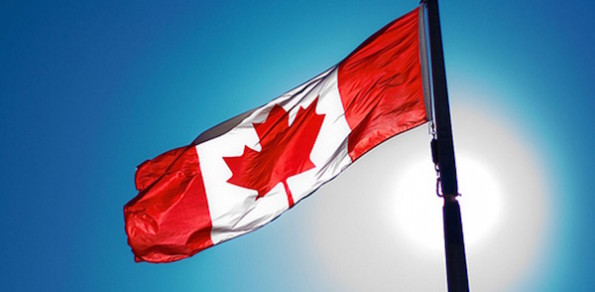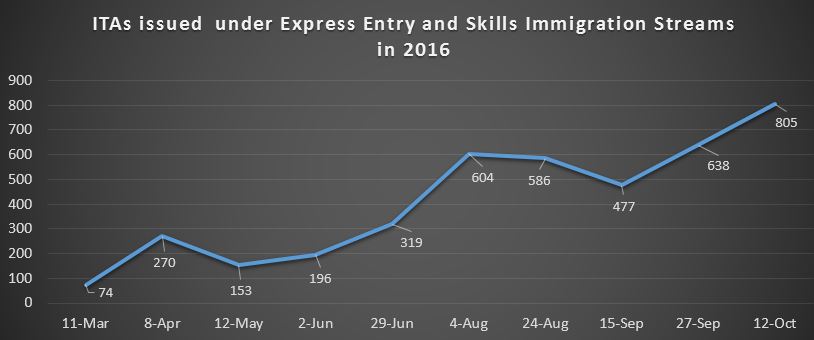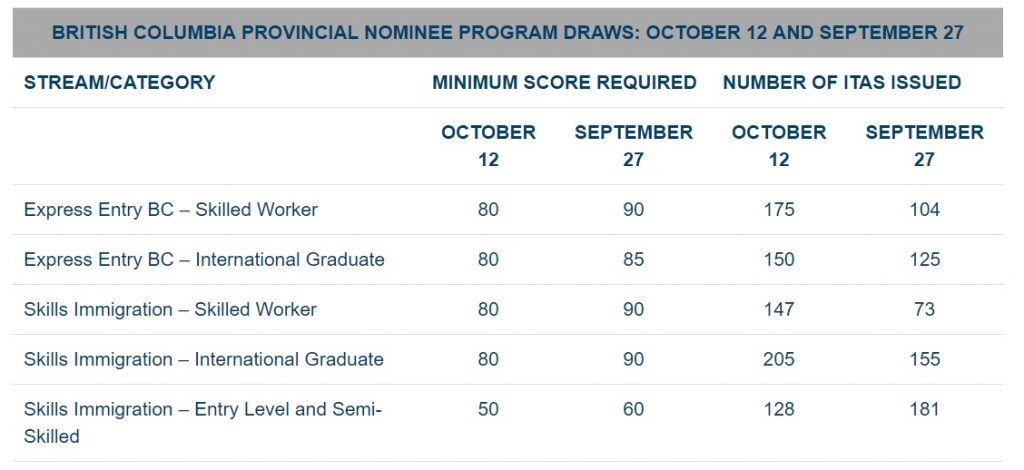051 8439995, 042 35911332

In its most recent draw, held on October 12, the British Columbia Provincial Nominee Program (BC PNP) issued 805 Invitations to Apply (ITAs) in five categories of the Express Entry BC and Skills Immigration streams. This represents the highest number of ITAs yet issued in a BC PNP draw. In addition, the points requirements for each category also decreased.
When BC makes one of its draws, top-scoring candidates in one of the categories under the Skills Immigration Registration System (SIRS) may receive an ITA. The SIRS is an intake management system that assigns a score to each candidate upon registration. The score is based on factors including civil status information, education, and work experience.

Upon registration, a candidate selects the category under which he or she may be eligible, and wishes to be considered. The BC PNP categories included under SIRS are:
- Express Entry BC — Skilled Worker: The Express Entry BC – Skilled Worker category is for international skilled workers who have post-secondary education or training and employment experience in a professional, management, technical, trade or other skilled occupation. Candidates must have a profile in the federal Express Entry pool. A successful application under this category results in the candidate receiving 600 points under the Comprehensive Ranking System (CRS) and a subsequent ITA at the federal level. A skilled job offer from a BC employer is required.
- Express Entry BC — International Graduate: International graduates who have graduated from a Canadian university or college within the past two years may be eligible to apply under the Express Entry BC – International Graduate category. Interestingly, this category is open to eligible graduates who graduated from a university or college in any location in Canada; it is not restricted to graduates from BC universities and colleges. This category is also aligned with the federal Express Entry system. A skilled job offer from a BC employer is required.
- Skills Immigration — Skilled Worker: This category is open to workers with post-secondary education or training and employment experience in a skilled occupation. A job offer from a BC employer is required. This is a base category, not aligned with Express Entry.
- Skills Immigration — International Graduate: Individuals who have graduated from an eligible Canadian university or college in the last two years, and who have an eligible job offer from a BC employer, may be eligible to apply under this category.
- Skills Immigration — Entry-Level and Semi-Skilled: Workers in certain entry-level or semi-skilled positions in tourism/hospitality, food processing, or long-haul trucking may be eligible for this category. The Skills Immigration — Northeast Pilot Project (through which workers in entry-level or semi-skilled positions living and working in the Northeast Development Region of British Columbia may be eligible to apply) is also included in this category. A job offer in an eligible occupation from a BC employer is required.
The maximum score possible is 200. During each draw, the top-scoring candidates are invited to apply to the BC PNP, and successful applicants receive a provincial nomination certificate. A base or enhanced nomination certificate allows an individual to subsequently apply for Canadian permanent resident status.
October 12 Draw
The October 12 draw saw the lowest points requirements so far in 2016 across all five categories included.

Certain categories of the BC PNP are not managed within the SIRS, and eligible individuals in these categories may apply directly to the BC PNP without needing to receive an ITA. The draws do not apply to candidates in the following categories:
- Skills Immigration – Health Care Professional
- Skills Immigration – International Post-Graduate
- Express Entry BC – Health Care Professional
- Express Entry BC – International Post-Graduate
The BC PNP: A History
2016 has seen dramatic changes in BC’s approach to immigration since the introduction of the SIRS. BC now has one of the most dynamic and active Provincial Nominee Programs (PNPs) in Canada.
- January 27: the BC PNP announced the launch of the SIRS in order to target the candidates most likely to respond to the province’s economic and social needs.
- March 11: the first ITAs were issued in a draw to candidates in the Express Entry BC — Skilled Worker and Skills Immigration — Skilled Worker categories.
- April 8: the first ITAs were issued in a draw to candidates in the Express Entry BC — International Graduate, Skills Immigration — Entry Level and Semi-Skilled, and Skills Immigration — Northeast Pilot Project categories.
- October 12: the most recent draw saw the highest number of ITAs yet issued in one draw in 2016, and the lowest required scores.
BC Sets Example for other Provinces
“Throughout 2016, BC has emerged as a leader among the Provincial Nominee Programs,” says Attorney David Cohen. “Draw after draw, we see more people being selected. Within less than 12 months, this new points system has proven successful both at pinpointing talented individuals, and managing frequent and growing draws.”
British Columbia profile
Population: 4,751,612 (July 1, 2016)
Largest city: Vancouver
Capital city: Victoria
Official language: English (de facto)
Unemployment rate: 5.7% (September 2016)
Economy: BC has the highest percentage of service industry jobs in Western Canada, comprising 81% of the province’s industry. As of September 2016, the largest section of this employment is in Wholesale and Retail Trade. Many areas outside metropolitan areas, however, are still heavily reliant on resource extraction. GDP per capita is CAD $51,135 (2014).
Location: West coast of North America. BC is bordered to the east by the Canadian province of Alberta, to the south by the U.S. states of Washington and Montana, to the west by the Pacific Ocean and the U.S. state of Alaska, and to the north by the Canadian territories of Yukon and Northwest Territories.
Climate: The coast, as well as Metro Vancouver and certain valleys in the south-central part of the province, experience mild weather, encouraging outdoor recreation and long growing seasons. The interior has some of the warmest and longest summer climates in Canada. Colder climates, similar to other regions of Canada, are found in the central and northern areas of the province.
